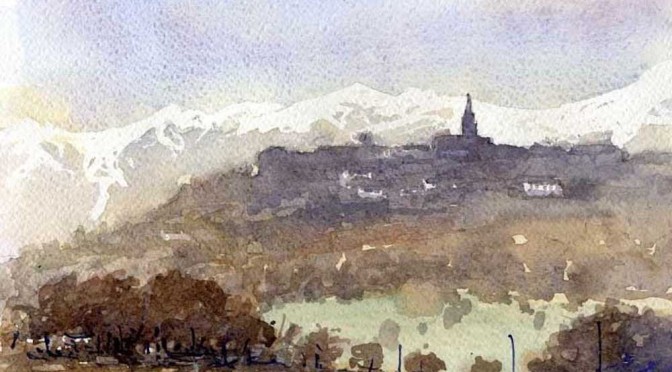Born Again Cathars
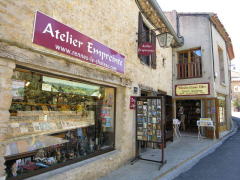 During visits to Occitan I had many discussions about the Cathar faith; with librarians, born again Cathars, but mostly with those promoting “Catharism” or “Les Pays Cathares” as a tourist attraction.
During visits to Occitan I had many discussions about the Cathar faith; with librarians, born again Cathars, but mostly with those promoting “Catharism” or “Les Pays Cathares” as a tourist attraction.
The conversations were informal in the extreme and everyone I spoke to had different opinions. I made notes only of opinions which were commonly held.
There seems to be general agreement that the Cathars internally referred to themselves as “Les Bonnes Gens”, the good people.
I found much enthusiasm for a return to Catharism, with the occasional suggestion that it was still the underlying faith in Occitan. This enthusiasm was not supported by any consideration, regard for, or analysis of, what the implications of a return to Catharism might be.
The Name
I encountered an innocent view of the faith as a different and possibly better formula for governing human relationships.I was guided to fragments of documents which supported the beliefs which flowed so readily in casual conversation. Across dozens of references and discussions which there were recurring themes but little of this oral tradition has made it into into mainstream print.
As an example the people I talked to were happy to accept the term “Cathars” as the name of the religion. They gave me the source:-
Greek katharsis, from kathairein ‘cleanse,’ from katharos ‘pure.’
Catharsis, the process of releasing, and thereby providing relief from, strong or repressed emotions.
Mainstream history insists however that the name is invented by enemies and is derived from the medieval german word for cat. It is said to be a reference to the belief that during Cathar ceremonies attendees kissed the backside of a cat.
The Good Man
 And yet, the worst demon she faces is that she is not sure she believes implicitly in what she is being asked to fight, perhaps give her life, for. she forces herself to re-examine and re-evaluate her beliefs.
She has been taught that the reason Jesus attracted notice was because he was not a carpenters son, as the Church of Rome would have us believe, but the conjoin of many important blood lines. If he had chosen a different path he could have been ruler of the whole world.Jesus was not god but a good man.
And yet, the worst demon she faces is that she is not sure she believes implicitly in what she is being asked to fight, perhaps give her life, for. she forces herself to re-examine and re-evaluate her beliefs.
She has been taught that the reason Jesus attracted notice was because he was not a carpenters son, as the Church of Rome would have us believe, but the conjoin of many important blood lines. If he had chosen a different path he could have been ruler of the whole world.Jesus was not god but a good man.
In view of the tile of choice as “les bonnes hommes” the description of Jesus as a good man may simply mean therefore that he shared their faith. In any case Jesus was not here to save us but to give us a message.
The reason Jesus message was highly regarded was because he was not a carpenter but a famous person. Why he was famous is more elusive but the conclusion is that whatever he preached was from the very beginning promoted by the Roman state.
The illusion
 Jesus true message was that mankind must celebrate diversity not discriminate because of it. He taught that there is only one Good God, though that God has been called many different names. The creation of nations, sanctioned by the Roman Church is, like marriage, an attempt to manipulate possession of material possessions. To achieve reunion with that God it is essential to abandon all preoccupation with the material world. One nation, one God, one way of worshipping that God,a worship which has no need of priests, churches, elaborate ceremonials or rich vestments.Cathars believed that the message propagated by Jesus was One God , one State. Note that this can be interpreted as “no nations and no religion” It was specifically intended to undermine the Jewish Messianic faith and it’s vision of Jewish domination of the whole world. The Church of Rome claimed that Jesus was the Jewish messiah in order to pervert the memory of what Jesus stood for and to propagate their own dogma.
Jesus true message was that mankind must celebrate diversity not discriminate because of it. He taught that there is only one Good God, though that God has been called many different names. The creation of nations, sanctioned by the Roman Church is, like marriage, an attempt to manipulate possession of material possessions. To achieve reunion with that God it is essential to abandon all preoccupation with the material world. One nation, one God, one way of worshipping that God,a worship which has no need of priests, churches, elaborate ceremonials or rich vestments.Cathars believed that the message propagated by Jesus was One God , one State. Note that this can be interpreted as “no nations and no religion” It was specifically intended to undermine the Jewish Messianic faith and it’s vision of Jewish domination of the whole world. The Church of Rome claimed that Jesus was the Jewish messiah in order to pervert the memory of what Jesus stood for and to propagate their own dogma.
Cathars believed Jesus’ death and cruxifiction was “an illusion” though once again the definition of what “illusion” is imprecise. One interpretion of illusion is that Jesus survived the cruxifiction but another is that the whole story of Jesus is a fabrication, a story told to convey the message and bears no relation to the real man.
Earlier faiths
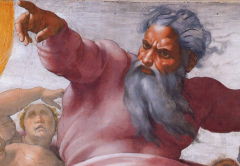 The Church of Rome is an agent of the devil. It must be because their God is the God of the old testament, the God of the Jews the God of creation. Their God is actually Set, the Egyptian god of conflict and chaos. The Jews started to worship Set when they were in Egypt and continued to worship him when they left. The prayer to Set called "Our Father' is an unacceptable chant of praise for the wickedness of the material world.The Cathars totally rejected the old testament and used knowledge of the new testament only to refute the teaching of the Church of Rome, which claimed to be Catholic (universal) but in fact was not.
The Church of Rome is an agent of the devil. It must be because their God is the God of the old testament, the God of the Jews the God of creation. Their God is actually Set, the Egyptian god of conflict and chaos. The Jews started to worship Set when they were in Egypt and continued to worship him when they left. The prayer to Set called "Our Father' is an unacceptable chant of praise for the wickedness of the material world.The Cathars totally rejected the old testament and used knowledge of the new testament only to refute the teaching of the Church of Rome, which claimed to be Catholic (universal) but in fact was not.
There was however the bad god to contend with and the bad god was the Egyptian God, Set who was one and the same as the Jewish god YHWH( Jehovah)
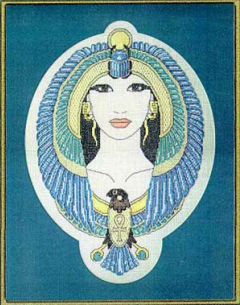 Jesus message was based on earlier teachings, possibly an amalgamation of several different faiths such as the Egyptian worship of Isis.
Jesus message was based on earlier teachings, possibly an amalgamation of several different faiths such as the Egyptian worship of Isis.
Zarathrustra
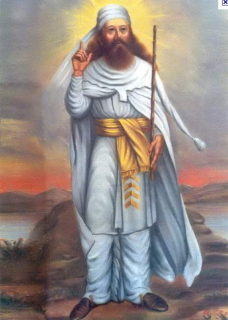 There are also strong parallels with the teachings of Zarathrustra and both the pentacle The sacred flame have places of reverence in both faiths.
There are also strong parallels with the teachings of Zarathrustra and both the pentacle The sacred flame have places of reverence in both faiths.
The sacraments
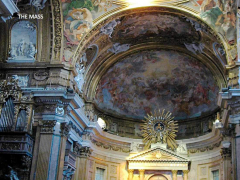 The " mass" was not part of the functioning of the early church.
It was six hundred years before attendance was made compulsory. This was the first attempt by the church to "know it's own" And to collect money from everyone who attended.The Cathars were opposed to the ceremonial practices of the Roman church.
The " mass" was not part of the functioning of the early church.
It was six hundred years before attendance was made compulsory. This was the first attempt by the church to "know it's own" And to collect money from everyone who attended.The Cathars were opposed to the ceremonial practices of the Roman church.This included the sacraments themselves, the building of expensive churches the wearing of expensive vestments and jewellery and the hedonistic lifestyle of the clergy.
The Gift
 She has given us sexual pleasure as a small sample of what reunion will be like. Sexual pleasure is purely spiritual and is not part of the material world. The worst distraction of all is to fall in love with material possessions,land, property,jewels and precious metals. All this is far less important than spiritual life.The pleasure of sex was a gift from god to show what the eventual union with him might be like.
She has given us sexual pleasure as a small sample of what reunion will be like. Sexual pleasure is purely spiritual and is not part of the material world. The worst distraction of all is to fall in love with material possessions,land, property,jewels and precious metals. All this is far less important than spiritual life.The pleasure of sex was a gift from god to show what the eventual union with him might be like.
Therefore there was no sin in sexual pleasure however it might be obtained. This was readily championed by the men and women I met but under mild questioning most admitted it was “perhaps not for me”
relationships
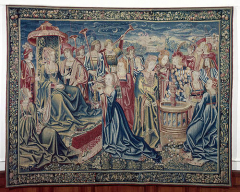 Both men and women were free to have multiple relationships but if a couple chose to be monogamous then that too was acceptable, as long it was the free will of both parties. Social life was organised to make it possible for women to meet other potential partners and for men to express their admiration for other women. The decision on wether a new relationship would be entered into was entirely the woman’s. The aristocratic version of this social activity is what has become known as the courts of love, but similar events took place at all levels of society.
Both men and women were free to have multiple relationships but if a couple chose to be monogamous then that too was acceptable, as long it was the free will of both parties. Social life was organised to make it possible for women to meet other potential partners and for men to express their admiration for other women. The decision on wether a new relationship would be entered into was entirely the woman’s. The aristocratic version of this social activity is what has become known as the courts of love, but similar events took place at all levels of society.
These relationships are entirely honourable but are usually conducted in a discreet manner. However within a single household there could be multiple relationships.
There were huge differences in interpretation of sexual morality amongst the people I talked to, ranging from the Cathars believing that all sexual content was evil to a belief that the pleasure of sex was a gift from god to show what the eventual union with him might be like and that therefore there was no sin in sexual pleasure,howeverit might be obtained. I have mede this latter issue an evolving problem for Ximene.
Inheritance
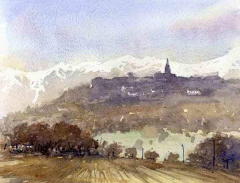 Inheritance (the possession of worldly goods) was also simple. Women and men could and did both have private possessions. A husband did not automatically acquire possessions from his wife. Nor did a woman automatically control her husbands possessions. All wealth of each individual was uniformly distributed to all children.
Inheritance (the possession of worldly goods) was also simple. Women and men could and did both have private possessions. A husband did not automatically acquire possessions from his wife. Nor did a woman automatically control her husbands possessions. All wealth of each individual was uniformly distributed to all children.
Thus a child would inherit quite independently from mother and father. A woman would know without doubt who her children were but a man had to claim children, at birth. An unclaimed child inherited only from the mother. As the number of children was small this created few problems even where landholdings were concerned.
Reliability
These sources of information can hardly be regarded as reliable. I am aware that, in terms of normal scholarship, this information is virtually worthless. It is all opinion, often emotionally charged opinion but nothing more. It is fair to say however the same criticsm could be levelled at many champions of mainstream christianity.
However the notes above were taken before 2008 and it interesting to note that this oral tradition stands up very well in the face of much research I have carried out since then.
